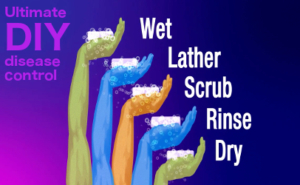Fight Germs. Clean hands help prevent infections
This handwashing demonstration will show you how handwashing can get rid of germs and chemicals that get on our hands every day.
Fight Germs. Wash Your Hands Transcript
Handwashing is one of the most important ways you can keep from getting sick and spreading germs to others! Dirty hands spread disease. This handwashing demonstration will show you how handwashing can get rid of germs and chemicals that get on our hands every day.
This gel is like the germs and chemicals that we get from things we touch throughout the day – like our toys and pets. If we then rub our eyes, nose, or mouth, or pick up something to eat, the germs or chemicals can get into our bodies and make us sick. Studies have shown that people touch their eyes, nose, and mouth about 25 times every hour without even realizing it!
To get rid of these germs and chemicals, CDC recommends you follow these easy steps every time you wash your hands: wet, lather, scrub, rinse, and dry. We’re going to show you the right way to do each step.
First, wet your hands with clean running water, turn off the tap, and apply soap. Then, lather your hands by rubbing them together with the soap. Be sure to lather the backs of your hands, between your fingers, and under your nails.
Scrub your hands for at least 20 seconds. If you don’t have a clock nearby, keep scrubbing until you’ve sung the “Happy Birthday” song twice.
Rinse your hands well under clean, running water.
Dry your hands using a clean towel, electric hand dryer, or air dry them.
Washing your hands using the steps we just demonstrated is very important to get hands completely clean. Let’s see how well we got rid of the germs and chemicals.
Great! No more germs and chemicals! Why is this so important?
Germs and chemicals from unwashed hands can get into our foods and drinks when they’re being prepared or when we’re eating or drinking them, which can make us sick. Also, germs and chemicals from unwashed hands can be transferred to other objects, like cellphones, table tops, or toys, and then transferred to other people’s hands.
That’s why it’s so important to wash your hands following these steps: wet, lather, scrub, rinse, and dry, so you can stay healthy and help keep those around you healthy!
For more information visit cdc.gov/handwashing

Page last reviewed: December 13, 2017
Content source: Centers for Disease Control and Prevention

